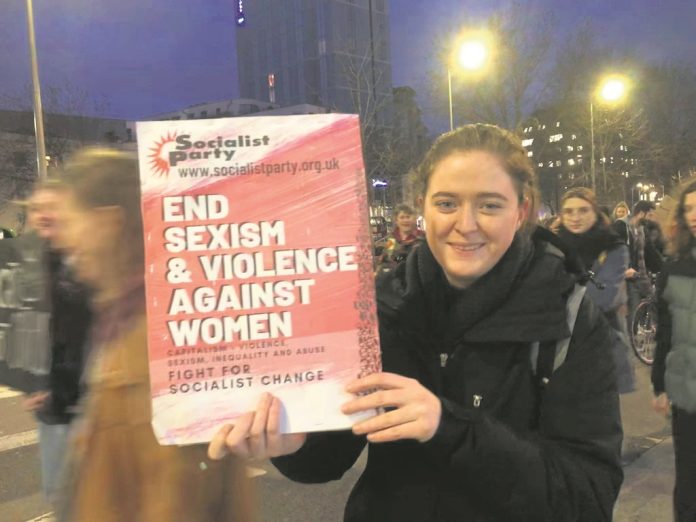Amy Sage, Bristol North Socialist Party
Sexual violence and harassment are endemic at UK Universities. In a national survey conducted by The Student Room and Revolt Sexual Assault between 2017 and 2018, 62% of students and recent graduates reported that they had experienced some form of sexual violence. While sexual violence is not an issue that exclusively affects women, female students reported much higher rates of harassment and assault than male students.
In a more recent survey, it was revealed that 370 allegations of sexual assault on university premises and 320 reports of rape had been made to the police since 2019 – averaging over three a week! Given what we know about how underreported incidents of this type are, this is likely to be just the tip of the iceberg.
Despite these staggeringly high numbers, however, many students feel they cannot report their experiences. In the Revolt report, only 6% of those who had experienced sexual assault or harassment reported the incident to either the police or the university. When asked why, students stated that they either didn’t know how to report it or expressed fears that they would not be taken seriously.
Such fears are not surprising when you consider the case of one female student at the University of Bristol who reported rape by a fellow student, reported in the Independent. She reported the assault to the university and, rather than taking action against her alleged attacker, they simply told her not to go near or contact him. This inaction on the part of Bristol University meant that the female student kept running into her attacker and was even forced to take an examination in the same exam hall as him.
It is not just students who are experiencing sexual violence on the campuses, however. One survey found that one in ten college and university staff have experienced workplace sexual violence in the last five years, the majority responding that they did not report it to their employer. Where reports were made to the employer, some described being pressured to resolve complaints informally to avoid reputational damage.
This response highlights a pattern of behaviour by some university bosses where, rather than acknowledging the scale of the problem, they try to minimise or conceal the extent of sexual misconduct on campus. One third of universities have been found to use Non-Disclosure Agreements (NDAs) which silence student complaints about sexual misconduct, harassment and bullying, allowing Higher Education institutions to prioritise their reputation over student and staff safety.
Union and student-led inquiry
We urgently need a trade union and student-led inquiry into the true extent of sexual misconduct on the campuses. Trade unions should be demanding that universities end their use of NDAs in cases involving allegations of sexual misconduct, which are used only to conceal the extent of the problem and avoid taking responsibility for the issue.
We also need democratically organised and controlled committees, involving staff, students and specialist support services that can properly investigate allegations of sexual violence involving students and university staff, both on and off campuses.
There are also practical measures that can be implemented to improve student safety, including accessible and trusted campus wardens; chaperoned night transport; zero-tolerance policies in university facilities; adopting a community bystander training programme, giving anyone witnessing abusive or discriminatory behaviours the confidence to intervene or offer help. Specialist services offering support to those who have experienced sexual misconduct, which have been decimated by capitalist austerity, need considerable investment so that they are able to offer vital services to those who need them.
However, it is also important to understand where gender oppression and violence against women come from. Research conducted in 2020, ‘Unsafe Spaces’, highlighted the role of a ‘lad culture’, prevalent particularly in student sports clubs, in the rise in incidents of male sexual violence against women. They argued that it created a ‘toxic atmosphere’ which leads to sexual assault and harassment.
While the impact of this cannot be denied, we have to look more broadly at the causes of violence against women. Ultimately, individual attitudes are shaped by the social and economic context in which we live. Capitalist class society is the root cause of today’s sexism and sexist ideas as its structures and ideology perpetuate the idea that women are inferior and their bodies are commodities or objects (see ‘How can women’s oppression be ended?’).
Ultimately, to tackle the root causes of violence against women, both on and off the campus, a complete overturn of the existing social and economic structure of society is necessary, to replace the rotten capitalist system with socialism. A system based on democratic workers’ control of what we need, not divisive competitive capitalism.
The Socialist Party demands:
- A student and trade union-led inquiry into the full extent of sexual violence and harassment on campus
- An end to the use of Non-Disclosure Agreements in cases involving allegations of sexual misconduct
- Democratically organised and controlled committees, involving staff, students and specialist support services to investigate allegations of sexual violence involving students, both on and off university campuses
- Fully funded services on campus to ensure staff and student safety, including support services, campus lighting, safe transport and non-exploitative, affordable housing
- End the capitalist system that maintains and promotes sexist ideas. Fight for a socialist alternative








